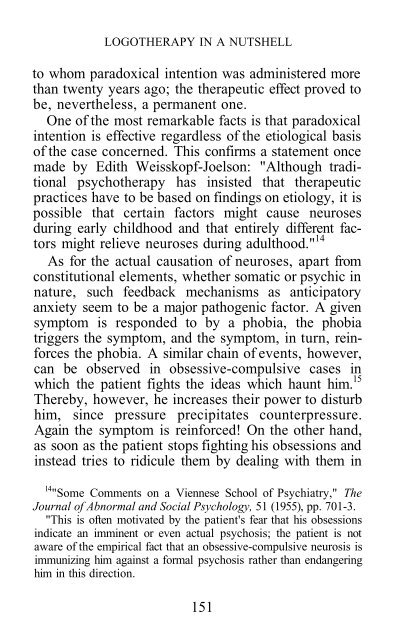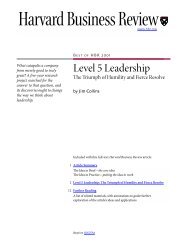Man's Search For Meaning - Viktor E. Frankl
Man's Search For Meaning - Viktor E. Frankl
Man's Search For Meaning - Viktor E. Frankl
Create successful ePaper yourself
Turn your PDF publications into a flip-book with our unique Google optimized e-Paper software.
LOGOTHERAPY IN A NUTSHELL<br />
to whom paradoxical intention was administered more<br />
than twenty years ago; the therapeutic effect proved to<br />
be, nevertheless, a permanent one.<br />
One of the most remarkable facts is that paradoxical<br />
intention is effective regardless of the etiological basis<br />
of the case concerned. This confirms a statement once<br />
made by Edith Weisskopf-Joelson: "Although traditional<br />
psychotherapy has insisted that therapeutic<br />
practices have to be based on findings on etiology, it is<br />
possible that certain factors might cause neuroses<br />
during early childhood and that entirely different factors<br />
might relieve neuroses during adulthood." 14<br />
As for the actual causation of neuroses, apart from<br />
constitutional elements, whether somatic or psychic in<br />
nature, such feedback mechanisms as anticipatory<br />
anxiety seem to be a major pathogenic factor. A given<br />
symptom is responded to by a phobia, the phobia<br />
triggers the symptom, and the symptom, in turn, reinforces<br />
the phobia. A similar chain of events, however,<br />
can be observed in obsessive-compulsive cases in<br />
which the patient fights the ideas which haunt him. 15<br />
Thereby, however, he increases their power to disturb<br />
him, since pressure precipitates counterpressure.<br />
Again the symptom is reinforced! On the other hand,<br />
as soon as the patient stops fighting his obsessions and<br />
instead tries to ridicule them by dealing with them in<br />
l4 "Some Comments on a Viennese School of Psychiatry," The<br />
Journal of Abnormal and Social Psychology, 51 (1955), pp. 701-3.<br />
"This is often motivated by the patient's fear that his obsessions<br />
indicate an imminent or even actual psychosis; the patient is not<br />
aware of the empirical fact that an obsessive-compulsive neurosis is<br />
immunizing him against a formal psychosis rather than endangering<br />
him in this direction.<br />
151







